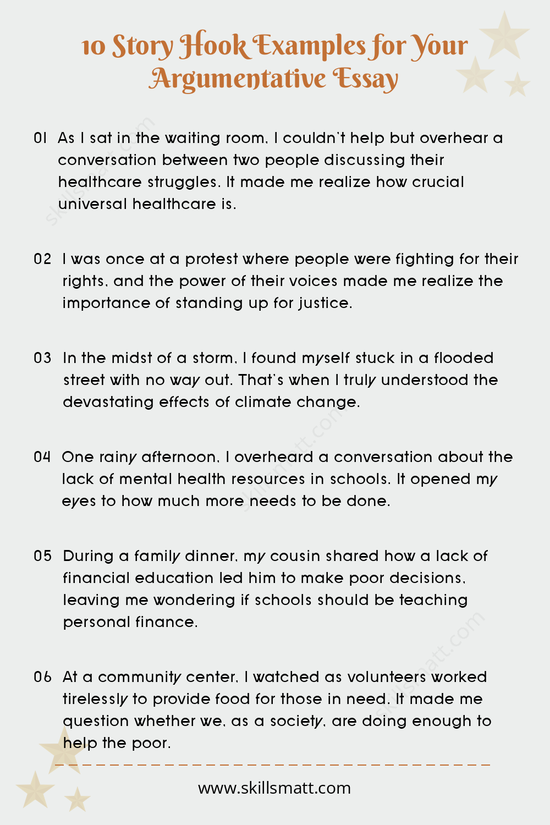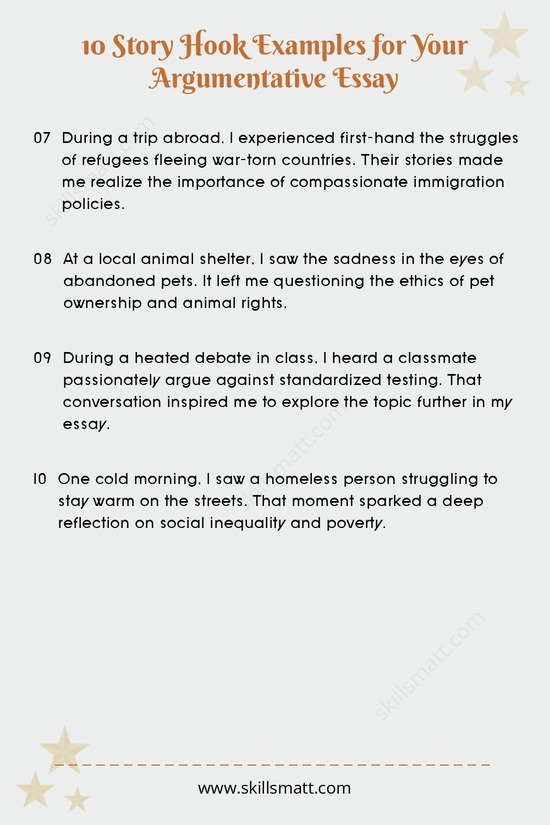10 Story Hook Examples for Your Argumentative Essay
Starting an argumentative essay with a compelling story can captivate your audience right from the beginning. Stories offer a human connection to abstract issues, making them more relatable and impactful. Below are 10 engaging story hooks that can draw your readers in:
- As I sat in the waiting room, I couldn’t help but overhear a conversation between two people discussing their healthcare struggles. It made me realize how crucial universal healthcare is.
This story offers an emotional entry into the debate about healthcare, giving the reader insight into real-world struggles that could form the basis of a discussion on the need for universal healthcare systems. - I was once at a protest where people were fighting for their rights, and the power of their voices made me realize the importance of standing up for justice.
By sharing a personal experience at a protest, this story invites readers to think about the importance of advocacy and justice, encouraging them to engage with essays about civil rights or activism. - In the midst of a storm, I found myself stuck in a flooded street with no way out. That’s when I truly understood the devastating effects of climate change.
This story brings the abstract concept of climate change into a tangible reality, making it an excellent hook for essays on environmental issues or the urgency of climate action. - One rainy afternoon, I overheard a conversation about the lack of mental health resources in schools. It opened my eyes to how much more needs to be done.
By sharing a casual yet impactful conversation, this story raises awareness about the lack of mental health resources in schools, setting the stage for an essay on the importance of supporting mental health in education. - During a family dinner, my cousin shared how a lack of financial education led him to make poor decisions, leaving me wondering if schools should be teaching personal finance.
This personal story about financial struggles opens up a larger discussion on the role of education in personal financial literacy, perfect for essays about educational reform or financial responsibility. - At a community center, I watched as volunteers worked tirelessly to provide food for those in need. It made me question whether we, as a society, are doing enough to help the poor.
This story provides a firsthand look at the challenges faced by underprivileged communities, setting up a discussion about poverty and the ethics of charity and social responsibility. - During a trip abroad, I experienced first-hand the struggles of refugees fleeing war-torn countries. Their stories made me realize the importance of compassionate immigration policies.
This story creates a personal connection with the refugee crisis, highlighting the human element of immigration debates, and encouraging readers to think critically about immigration policies. - At a local animal shelter, I saw the sadness in the eyes of abandoned pets. It left me questioning the ethics of pet ownership and animal rights.
By telling the story of a visit to an animal shelter, this hook invites readers to reflect on the responsibilities of pet ownership and the ethical treatment of animals, making it ideal for essays on animal rights. - During a heated debate in class, I heard a classmate passionately argue against standardized testing. That conversation inspired me to explore the topic further in my essay.
This story about a debate in class serves as a launching point for discussing the pros and cons of standardized testing in education, encouraging readers to examine the broader implications of testing on students. - One cold morning, I saw a homeless person struggling to stay warm on the streets. That moment sparked a deep reflection on social inequality and poverty.
This personal encounter with homelessness offers a strong emotional appeal to readers, setting up an essay about poverty, inequality, and the role of social programs.
Using a story to start your essay makes the topic more immediate and humanizes complex issues. Choose a story that connects personally to the topic you're addressing to create a meaningful connection with your audience.


